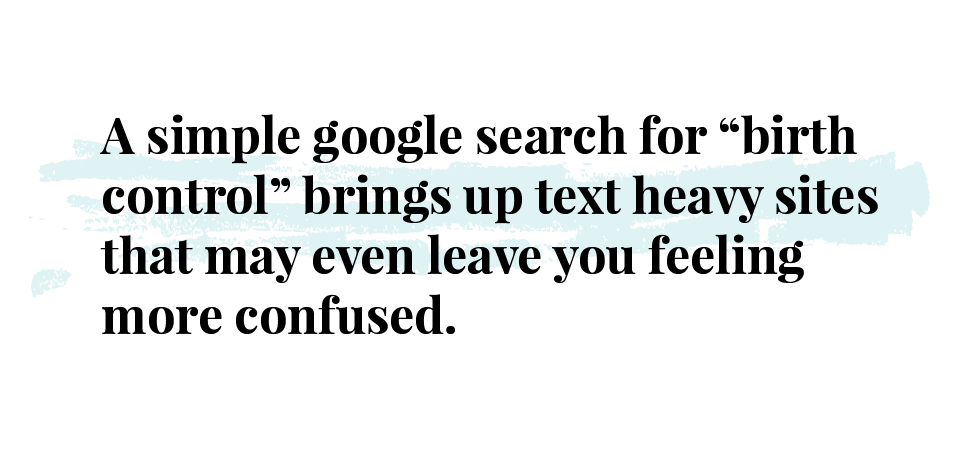As women, we are faced with a lot of options for pregnancy prevention. From pills to implants condoms and even sponges, the options are endless.
Like many women, I found myself overwhelmed by the options as I was choosing a birth control. While I wanted something safe and effective, I was worried I would forget to take a pill every day at the same time. So, my doctor recommended that I try an IUD, a device that is inserted into the uterus to prevent pregnancy.
Because of some past medical history, my doctor put me on the copper IUD, a non-hormonal birth control. Insertion was easy, despite some mild cramps, and I went home excited that I wouldn’t have to think about birth control on a daily basis.
What Happened Next
But the side effects started almost immediately. Heavy cramping, nausea, depression, and consistent spotting got so intense that I called my doctor on multiple occasions in tears. Every time, he wrote it off as “nothing to worry about” and “typical side effects” of the copper IUD. So, despite my better judgement, I listened. But it was only when I wound up in the emergency room that my side effects were taken seriously.
Turns out, my IUD was inserted incorrectly, and I only would have had two days before I bled out.
So what went wrong? In my eyes, I had done everything right. I thought of myself as an educated healthcare consumer. I went to my yearly physicals, asked the right questions (or so I thought), and called my doctor when I felt like something was off. And still, the worst-case scenario happened.
I’m sure I'm not the only woman to experience a story like this. If you’re sexually active nowadays, you’re probably on some form of birth control—It’s the norm nowadays. But birth control isn’t like taking a daily multivitamin, it can increase your risk for breast cancer, depression, blood clots, and skin discoloration. And IUDs can cause more serious side effects like an ectopic pregnancy or punctured uterus. But despite these more serious side effects, prescribing is taken lightly, and side-effects are ignored.
So how can you be an active participant in your reproductive health? And how can you make sure that you are on the right birth control, and staying healthy while also preventing pregnancy?
Learn about the different birth control options
From IUDs to implants, pills, condoms, and sponges, birth control comes in many different shapes and sizes, but the differences between them are becoming harder to parse. And while it’s important to educate yourself on the different methods, a simple google search for “birth control” brings up text-heavy sites that may even leave you feeling more confused.
So how can you effectively compare the pros and cons and make sure that you are on the right birth control for your body? One site,
Iodine, compares birth control beyond the condoms and pills. In addition to detailing information about the drug, they list a “worth it” score, a rating of how well a medication works for someone. Iodine even details pregnancy statistics from some of their users.
If you’re looking to explore these options with a healthcare practitioner,
Tia, for example, is a membership-based
women’s health clinic aimed at helping women access full-body healthcare and can connect you with a gynecologist or even an acupuncturist.
Learn what can make your birth control fail
Yes, birth control is very effective at preventing pregnancy—but there are some things you can do to inadvertently increase your chances of getting pregnant. Skipping a dose, smoking, or even taking antibiotics can reduce the effectiveness of the birth control pill. And in the case of IUDs, you may have to wait seven days for the device to start preventing pregnancy.
It’s important to be aware of these factors. If you’re ever concerned that your birth control might not be working properly, speak with your doctor, and in the meantime, augment your birth control with other pregnancy prevention methods, like a condom.
Advocate for your body
It's not uncommon for doctors to write off symptoms as "period pain" or "routine side effects" of birth control. But, you’re in your body, not your doctor. So, you can tell when things are business as usual and when things feel off. So, listen to that voice, and advocate for your body.
But advocating is easier said than done and it’s easy to feel intimidated, overwhelmed and rushed while your in the doctor’s office. Make sure you are honest with your doctor; don’t just tell them what you think they want to hear. Clearly describe your symptoms in terms that are measurable if possible, and most importantly, don’t be afraid to ask questions, seek clarification, or even ask for a detailed write-up of your care plan.
Start thinking about your fertility, even if you’re not ready for kids
There is a common misconception that birth control can reduce your chances of getting pregnant. While birth control typically won’t make you less fertile, the birth control method you choose might make your fertility journey a bit more complicated. For instance, some doctors recommend that women be off of their birth control pills for two months before trying, and if you have an IUD or an implant, you’ll need to work with your doctor on getting the device removed.
If you’re interested in learning more about your fertility, explore some of the fertility start-ups that are popping up.
Kindbody, a company based in New York, is on a mission to destigmatize women's fertility care and make it accessible. Their team of healthcare providers offers services ranging from fertility assessments, wellness coaching to even IVF. Another company,
Modern Fertility, makes fertility testing simple—by providing you with at-home fertility hormone test.
Explore the different ways of getting your birth control prescription
These days, you don’t necessarily need to visit your doctor every month to get your birth control. Companies like
OneMedical can help connect you to qualified primary care physicians, and telemedicine companies like
HeyDoctor can help you get your birth control prescription online.
Also, in some states, you can purchase birth control over the counter. In Washington DC and 10 states, you can get your birth control prescription directly from your pharmacist, saving you a trip to the doctor. You will need to take a short screening test, but your pharmacist will help you find the birth control that you can afford.
Lastly, if you find that you are paying too much, you may want to consider shopping around for your prescription.
GoodRx is working hard to make medications affordable, and their coupons can help you save as much as 80% on your birth control.














